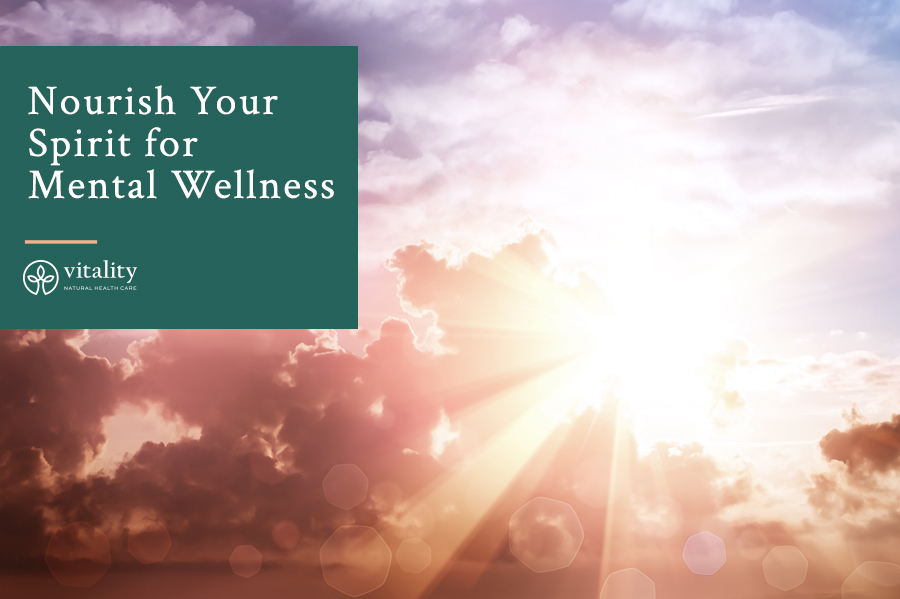When we talk about mental illness in the medical community, the conversation tends to be about neurotransmitter production, diet, exercise, and medication. And while I’ve touched on a few of these topics in this series on mental health , I believe there is one important aspect of mental health that often gets left out of the conversation: spirituality.
So in this fourth, and final blog of this series, I want to offer a few ways that you can nourish your spirit . This is an essential part of maintaining your mental health , whether you’re living with a mental illness or not.
Before we get started, however, I want to remind you that the information shared here is not meant to replace a relationship with a therapist or other healthcare provider. If you are in need of more personalized support, you can find a licensed mental health practitioner here, and 24/7 assistance is also available here should you need more immediate support.
How to nourish your spirit for a healthy mind
Spirituality.
This topic may be new to some of you and is easily misunderstood, so I want to take second to define it.
Spirituality, as I’m using it here, refers to your inner world or energetic life force and connection to a higher meaning or purpose. It’s not particularly religious, although it can be. My personal spiritual experiences are rooted in growing up Catholic but expand beyond religion. Know that spirituality and connection to your spirit can be non-denominational.
It’s important to maintain a connection to and nourish your spirit whether you are living with a mental illness or not. However, it becomes even more important when you are living with anxiety and depression since these mental illnesses can cause us to feel disconnected from ourselves and make it challenging to find meaning and purpose in life.
Without a deeper meaning or connection to something greater than ourselves, depressive episodes and anxiety can become much more challenging to manage.
You can connect to your inner spirit by doing the following as part of your wellness routine:
Create a sacred space
Whether you are new to the idea of spirituality or not, having a space that is conducive to connection and self-reflection is essential for your mental and emotional nourishment and well-being.
To start, choose a quiet space that feels safe and comfortable for you. In this space you’ll want to have a place to sit, like a cozy chair or a floor cushion. It may also help to have a small table where you can place objects or pictures that are special to you.
In my sacred space, I have pictures of my relatives, a set of angel cards, my favorite essential oils, as well as palo santo, sage, and a salt lamp.
Make time to reflect
Another way to nourish your spirit and maintain mental wellness is by making time to reflect. Get curious about your feelings and your wellbeing. I find journaling helps with this process.
Without judgment, as yourself questions like:
- How am I feeling?
- What people, places, and activities do I enjoy?
- What can I do to invite more joy into my life?
- What steps can I take to move in the direction of the life I envision?
Write down your answers and take small, actionable steps toward creating change. Remember, to be kind and compassionate with yourself in this process. Creating change can be challenging with a mental illness, so start small and seek out support when you need it.
Ground Yourself
Often, with anxiety and depression, our thoughts can become consumed by events of the past or projections into the future. In times when you find yourself becoming consumed by your thoughts, nourish your spirit by taking time to ground yourself in the present moment.
Put your feet on the floor and allow yourself to notice one thing in your environment that you can see – say what you see out loud. Do the same with your other senses.
Notice one thing that you can hear, smell, and touch. Say each thing out loud. For example, “I see a white wall…”
When you’re feeling more settled, it may also be helpful to incorporate a simple breathing exercise:
- Relax your shoulders as much as possible, then inhale slowly and deeply through your nose.
- Exhale slowly through your mouth. As you exhale, purse your lips slightly, keeping your jaw relaxed. You may hear a soft “whooshing” sound as you exhale.
- Repeat this breathing exercise 3-5 times, then breathe normally.
This breathing exercise can be done standing up, sitting down, or lying down. However, if you find this exercise to be challenging or believe it is making you more anxious or panicky, stop and revisit it at another time.
Meditate or Pray
Growing up in Ecuador I was raised Catholic. When I was a little girl, I found the church to be a very spiritually nourishing space, so much so that I would spend my lunch breaks at school in the chapel meditating, praying, and connecting with what I believe to be a higher power.
I discovered my connection to God or this higher Source, in the chapel, but you don’t have to go to a church to make this connection. Some people feel connected to something greater than themselves when meditating.
Whether you pray meditate, go out in nature, or something else, make time for a spiritual practice and prioritize your spiritual nourishment by making time to connect to whomever or whatever you identify as your life source or higher power.
This is a connection that you can utilize for support and strength when you are in need of balance.
Personally, I spend a lot of time in spiritual practice because even though I am a doctor and this topic isn’t discussed often in the medical field, I find that it plays a significant role in helping me to maintain both my mental and physical health .
I encourage you to explore this aspect of nourishment – it can be an incredible source of healing and support when you are managing anxiety and depression.
Remember, health and wellness are not limited to your spiritual body, it includes our emotional well-being and spirit as well. Try to keep them all in mind as you’re creating and implementing new health habits and routines.
xo,


